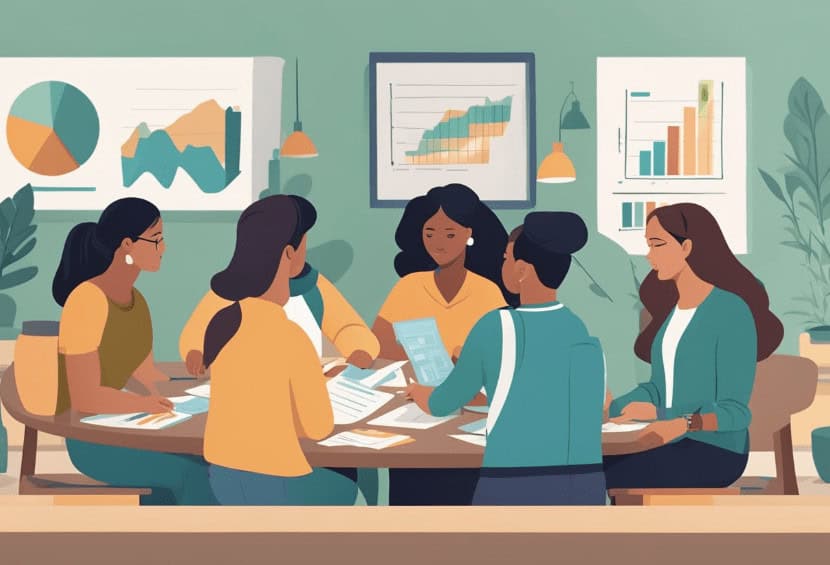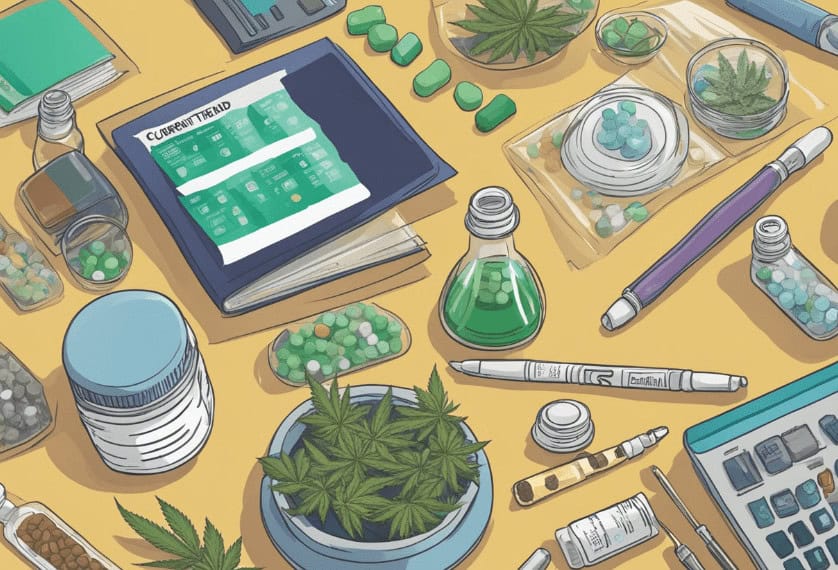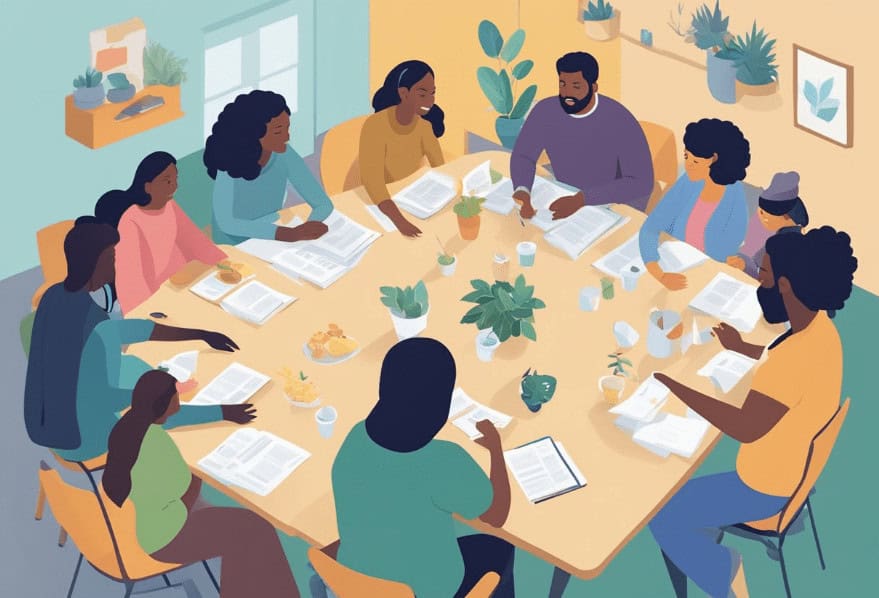Many parents today are concerned about the impact of drug decriminalization and legalization on their families. Understanding how decriminalization affects children is crucial for parents navigating this changing landscape.
One major shift in many countries is the move towards treating drug use as a public health issue rather than a criminal one. This change aims to reduce the stigma associated with drug use, encouraging individuals to seek help without fear.
It’s important for parents to grasp how these changes might influence their children’s attitudes and behaviors regarding drugs.
Additionally, the role of parents in this new environment becomes even more significant. By fostering open communication and educating their children about the risks and realities of drug use, parents can provide a stable foundation amidst evolving drug policies.

Marijuana and Other Drugs: Current Trends
The landscape of marijuana and other drug policies is changing rapidly. Key areas of focus include the increasing medical use of marijuana and the shift toward decriminalization and legalization.

Increasing Medical Use
Medical marijuana is gaining acceptance in many places. More states and countries are recognizing its potential benefits for treating conditions like chronic pain, epilepsy, and multiple sclerosis.
Research shows that medical marijuana patients report relief from symptoms with fewer side effects than traditional medications.
Doctors are now more likely to discuss medical marijuana as an option with patients. This shift is supported by studies demonstrating marijuana’s effectiveness in improving the quality of life for those with certain medical conditions.
Access to medical marijuana varies greatly. Some regions have well-regulated dispensaries, while others face availability and quality control issues. Parents looking to explore medical marijuana for their children should consult healthcare professionals and understand local laws.
Decriminalization and Legalization
Decriminalization and legalization trends are reshaping how society views marijuana and other drugs. Decriminalization typically involves reducing or eliminating criminal penalties for possessing small amounts, aiming to reduce the burden on the legal system and offer help over punishment.
This approach can lead to fewer arrests and a focus on health-based interventions.
Legalization goes a step further, allowing regulated sales and use of marijuana. States like Colorado and Washington have seen economic benefits, such as tax revenue and job creation, from legal marijuana markets.
However, the legal status of marijuana remains complex, with federal and state laws sometimes in conflict.
Parents should understand the differences between decriminalization and legalization to navigate the risks and benefits. Legal access does not mean marijuana is safe for all, especially young people. Public education plays a key role in these transitions, helping communities understand the implications of new drug policies.
Beyond medical marijuana, various regions around the world are exploring the decriminalization of other drugs as part of a broader harm reduction strategy. This approach aims to reduce the negative social and health-related impacts associated with drug use, shifting the focus from punishment to public health and safety.
- Psilocybin (Magic Mushrooms): Several places, including parts of the United States like Oregon and cities such as Denver, Colorado, have moved towards decriminalizing psilocybin. Research suggests that psilocybin has potential benefits for treating mental health issues such as depression, anxiety, and PTSD. Decriminalization efforts are primarily driven by emerging scientific evidence and advocacy from mental health professionals and patients seeking alternative treatments.
- MDMA (Ecstasy): Known for its use in psychotherapy for PTSD, MDMA is undergoing clinical trials that showcase its potential as a therapeutic agent. Some researchers and advocates are pushing for decriminalization as studies indicate MDMA can offer significant therapeutic benefits under controlled conditions.
- LSD: Like psilocybin, LSD is being investigated for its therapeutic potential, especially in treating anxiety and depression. While full decriminalization is less common, there is growing interest in research and therapy contexts, pushing the conversation about reconsidering its legal status.
- Ibogaine: Used in some countries for treating addiction, particularly opiate dependence, ibogaine is another substance being discussed in decriminalization debates. While it remains a controlled substance in most places, there is a push from some healthcare professionals and patients for clinical trials and research permissions.
- Cannabis Derivatives and Synthetics: Beyond THC, CBD (a non-psychoactive component of cannabis) and other cannabinoids are gaining recognition for their therapeutic properties. In many areas, these derivatives are increasingly being decriminalized for both medical and even recreational use due to their numerous health benefits and minimal side effects.
Social Media
As teens regularly use social media, they have noticed that platforms like Instagram, TikTok, and Twitter significantly shape perceptions around drugs and their decriminalization.
On TikTok, for instance, there is a lot of content that normalizes drug use, especially cannabis. Many users create videos showcasing their experiences with marijuana, often using hashtags like #weedtok and #cannabiscommunity.
These videos can make it seem like smoking weed is a common and harmless activity, which influences how their peers view its legality and safety. Some creators even discuss the benefits of cannabis for mental health, which can lead to a more favorable perception of its use and push for its decriminalization.
Instagram also plays a role, with influencers posting about lifestyles that include drug use, often accompanied by hashtags such as #420 and #stoners. This creates a culture where drug use appears trendy and accepted.
Posts about the benefits of decriminalization and legalization often circulate, promoting discussions about changing laws, especially around cannabis.
On Twitter, conversations about drug policy are more political. Hashtags like #DecriminalizeDrugs and #EndTheWarOnDrugs are common, with users sharing articles and opinions about the failures of current drug policies.
This platform often serves as a space for advocacy, where people argue that decriminalization could reduce stigma and improve public health outcomes.
The constant exposure to these narratives can shift perceptions, making drugs seem less dangerous and encouraging discussions about the need for reform in drug laws.
Challenges for Parents and Kids
Parents and kids face unique challenges when navigating a landscape with changing drug laws. Key difficulties include understanding the legal implications and maintaining open, effective communication.

Navigating the New Environment
With drug decriminalization, parents need to stay informed about the laws. For example, shifting regulations around parental marijuana use can affect family court cases. Understanding what is legal and what isn’t helps parents protect their families.
Additionally, parents must proactively address the stigma that often accompanies drug use, which can affect their children and family dynamics. This requires parents to first educate themselves about the societal perceptions and misconceptions related to drug use and how these views can impact both their child’s welfare and their approach to parenting.
By understanding the nuances of drug decriminalization and legalization, parents can better navigate conversations about drug use, emphasizing empathy and understanding rather than judgment.
Addressing stigma involves actively challenging stereotypes and misinformation about individuals who use drugs and sharing this perspective with their children. Parents can model nonjudgmental attitudes and encourage their children to express their thoughts and questions freely.
Communication Strategies
Effective communication is essential. Parents should talk openly with their kids about drug use and its effects. Addressing the curiosity and confusion children might have can prevent misinformation.
Using clear and age-appropriate language aids understanding. Establishing rules and expectations regarding drug use is also crucial.
Parents should explain the legal and health consequences clearly. Encouraging questions and being available to talk helps build a trusting relationship.
Role-playing scenarios can prepare kids on how to handle peer pressure regarding drugs. Including other family members in these discussions can create a supportive home environment.
Role of Parents
Parents need to be well-informed about drug decriminalization to guide their children effectively. This includes understanding legal changes and potential effects on family dynamics. Knowledge about harm reduction and safe practices is crucial.
This intersection requires parents to gain a comprehensive understanding of how substances can impact mental health, both positively and negatively. For some, the availability of decriminalized substances might offer relief from conditions like anxiety or depression, while others may experience adverse effects or heightened vulnerabilities. Parents should educate themselves on these possibilities and be prepared to seek professional advice when needed.
To effectively address these issues, maintaining open lines of communication with their children is paramount. Parents should engage in regular discussions about drug use, the current legal landscape, and the potential health implications without judgment or alarm. Creating a dialogue that is honest and non-confrontational encourages children to share their experiences and concerns, contributing to a healthier and more supportive home environment.

Resources for Parents
Parents need reliable information to support their children through drug decriminalization. Educational programs are a vital resource, offering facts about drugs and their effects.
Workshops and seminars can engage parents in open dialogues about drug use and laws.
Support groups offer a community of parents facing similar challenges. These groups can provide emotional support and share effective strategies.
Additionally, online resources, like government websites, offer up-to-date legal information and parenting tips. Parents should also look into professional counseling services to help manage their children’s well-being.
These resources can help parents stay informed, supported, and prepared to navigate the complexities of drug decriminalization while promoting the well-being of their children.
- Substance Abuse and Mental Health Services Administration (SAMHSA) offers comprehensive educational programs and materials that provide factual information about drugs and their effects. The organization also provides resources for parents on substance abuse prevention and treatment.
- National Institute on Drug Abuse (NIDA) – Family Checkup provides evidence-based tools and strategies to help parents communicate effectively with their children about drug use. It includes videos, articles, and advice from experts.
- Partnership to End Addiction – Parent Support Network support network offers workshops and seminars that encourage open dialogue about drug use and laws. It connects parents with peer support groups to share experiences and strategies.
- Nar-Anon Family Groups provides support groups for families affected by a loved one’s addiction. These groups offer emotional support and practical strategies to cope and support one another.
- U.S. Department of Health & Human Services—About Youth Substance Use & Treatment is a government website that offers up-to-date legal information and parenting tips. It is a reliable source of advice on managing children’s well-being regarding substance use.
Role of Teens
Teens are directly impacted by drug decriminalization, especially regarding marijuana and other substances. They must be educated about the differences between decriminalization, legalization, and prohibition. Understanding these distinctions helps them make informed decisions.
It’s also critical for teens to have a thorough understanding of the potential health impacts of drug use, which is essential for their ability to make informed decisions about their well-being. Education on this topic should encompass both the immediate and long-term health effects associated with various substances, including the risk of addiction, mental health issues, and physical health problems like respiratory or cardiovascular conditions.
By gaining this knowledge, teens can better assess the risks associated with drug use and understand how these choices might affect their future health and quality of life.
Education efforts should also include emotional and mental health implications, making teens more resilient and informed.
Resources for Teens
Teens require straightforward and relatable resources to help them understand drug decriminalization.
Online platforms with teen-centric content can be highly beneficial. Websites and apps that offer facts, personal stories, and support forums provide a safe space for teens to learn and ask questions. Moreover, hotlines and chat services provide confidential support for those who need immediate help or advice.
Below is a list of resources designed to help teens understand drug decriminalization through engaging, relatable content.
-
- Drug Abuse Resistance Education (D.A.R.E.) educates youth on drug effects and laws. These programs often include interactive activities to engage teens and foster a deeper understanding.
- TeensHealth by Nemours provides age-appropriate, straightforward information about drugs, alcohol, and mental health. The website offers articles, personal stories, and advice tailored to teens to help them make informed decisions.
- Above the Influence empowers teens to recognize and resist the influences that can lead to drug and alcohol use. It features personal stories, factual information, and engaging content to help teens stand firm in their decisions.
- Drug Policy Alliance – Safety First is a program by the Drug Policy Alliance designed to provide high school students with honest information about drugs and drug decriminalization. It offers online educational materials that encourage safe and informed decision-making.
- National Institute on Drug Abuse (NIDA) for Teens offers interactive and educational content, including facts, videos, and quizzes about drug use and its effects. The website serves as a reliable resource for teens seeking information about drugs and how policies may impact them.
- Crisis Text Line is a free, 24/7 support service that offers confidential text support for teens in crisis or seeking advice. Trained counselors provide assistance and information on a range of issues, including substance use. Text HOME to 741741 to connect with a volunteer Crisis Counselor.
- Teen Line offers a hotline and online chat service where teens can talk with trained teen volunteers who offer support and resources about drug use and other issues. It provides a safe and confidential environment to ask questions and seek advice.
Role of Educators
Educators have a unique role in spreading knowledge and shaping attitudes toward drug decriminalization.
They should incorporate comprehensive drug education into their curricula, covering legal changes and health impacts. Teachers also need to create supportive environments for students affected by drug use.
This includes collaborating with parents and counselors. Awareness of community resources and harm reduction strategies can help educators guide students toward healthy choices and support systems.
Resources for Educators
Educators play a pivotal role in a teen’s understanding of drug-related issues.
Comprehensive training programs prepare teachers to address questions and provide accurate information about drug laws and policies. These programs often include curriculum materials and lesson plans tailored to various age groups.
Collaborating with local law enforcement and health professionals can enrich the educators’ knowledge base. Schools can organize informative assemblies and invite guest speakers to discuss real-life implications of drug use.
Additionally, online educational platforms supply teaching aids and up-to-date research to ensure educators can access the latest information.
The following resources equip educators with the tools and knowledge necessary to effectively educate students about drug laws, policies, and the real-world implications of drug use.
- National Institute on Drug Abuse (NIDA) offers comprehensive educational resources tailored for educators, including lesson plans, classroom activities, and drug facts. These materials help teachers provide accurate information and answer students’ questions about drug use and policies.
- The Substance Abuse and Mental Health Services Administration (SAMHSA) provides educational materials geared toward educators to aid in the prevention of substance abuse among youth. These materials include guides for creating a supportive school environment and integrating substance abuse education into the curriculum.
- Discovery Education—Opioid Epidemic and Prevention Resources offers free, standards-aligned resources designed to help educators teach students about the opioid epidemic and prevention strategies. These include curriculum guides, virtual field trips, and digital lesson plans.
- Foundation for a Drug-Free World provides an Educator’s Guide and comprehensive lesson plans covering a wide range of drugs and their effects. These resources are designed for a teen audience and are available for free.
- American School Counselor Association (ASCA) offers resources and recommended strategies for school counselors to support educators and students. It includes articles, webinars, and collaboration tips for engaging with local professionals to enhance substance abuse education.
- Curriculum and Instructional Materials Center (CIMC) provides educators with instructional materials related to health and drug education. These resources include lesson plans, teaching guides, and interactive activities suitable for various grade levels.
Parents, teens, and educators all play critical roles in supporting youths as they navigate the complexities of drug decriminalization. Access to resources and guidance is crucial for ensuring safe and informed decisions.

Frequently Asked Questions
This section addresses common questions parents might have about educating themselves on drug use, legal changes, recognizing signs of substance abuse, and where to seek help and support.
- How can parents educate themselves about substance abuse and its prevention?
Parents can start by reading research-based guides such as Preventing drug use among children and adolescents. These guides provide facts about drugs, their effects, and drug laws and policies. Additionally, attending workshops and seminars organized by schools or community centers can be highly beneficial.
- What legal changes should parents be aware of in the context of drug decriminalization?
Parents need to stay updated on both federal and state laws regarding drug use. Resources like the article on federal and state marijuana laws can help parents understand the current legal landscape and its implications for child welfare and parental rights.
- Where can parents find credible resources and support for substance abuse issues?
Parents can find credible information from government websites, local health departments, and community organizations. For academic and detailed resources, articles such as “Drug Policy and the Public Good” offer in-depth insights into drug policies and how they affect society.
- What are some strategies for discussing drug use and its implications with children?
Open, honest conversations are crucial. Parents should use age-appropriate language and provide facts without being alarmist. Establishing a safe and non-judgmental environment allows children to ask questions and express their views. Role-playing different scenarios can also help children make better decisions.
- How can parents recognize signs of substance abuse in their children?
Common signs of substance abuse include sudden changes in behavior, declining academic performance, and physical symptoms such as bloodshot eyes or unusual tiredness. Parents should stay engaged in their children’s lives and observe unusual changes.
- What community programs are available to assist with substance abuse education and prevention?
Many communities offer programs through schools, local health departments, and non-profit organizations. These can include after-school programs, counseling services, and educational workshops designed to teach both parents and children about the risks and prevention of drug abuse.
Keep the Conversation Going
Navigating the evolving landscape of drug decriminalization and legalization requires parents, teens, and educators to stay informed and proactive. Understanding the differences between decriminalization and legalization, recognizing the potential impacts on family dynamics, and fostering open communication are essential steps for families.
Parents play a pivotal role in guiding their children through these changes by educating themselves and maintaining a supportive environment. Teens benefit from clear, factual information to make informed decisions, while educators can enhance their curricula to address these critical issues.
By leveraging available resources and engaging in honest dialogues, families can better adapt to the shifting policies and ensure the well-being of their children.
